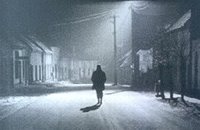 Shadows: Arthouse Films ’03
Shadows: Arthouse Films ’03
MONRAK TRANSISTOR | TO BE AND TO HAVE | WERCKMEISTER HARMONIES
< < M O R E | M O R E > >
More mainstream art films have their own pages.
Even more offbeat films are at the SHADOWS FILM FESTIVAL.
last update
23.Apr.03
 CRIMINAL LOVERS [Les Amants Criminels]
CRIMINAL LOVERS [Les Amants Criminels]

|
dir-scr Francois Ozon with Natacha Regnier, Jeremie Renier, Miki Manojlovic, Salim Kechiouche, Yasmine Belmadi, Bernard Maume, Jean-Louis Debard, Catherine Vierne, Marielle Coubaillon, Olivier Papot, Gil de Murger release US 21.Jul.00; UK 11.Apr.03 • 99/France 1h32  REVIEW BY RICH CLINE |
Like a Hitchcock classic, this film blurs the lines between innocence and guilt, examines the characters' complex motivations, and includes a heavy dose of irony. It also deals unconventionally with hot-potato topics like sexuality, violence, abuse, bondage, cannibalism and paedophilia. Ozon delights in giving us just what we never expect--most notably a deep vein of black comedy that plays with inexperience and innocence, which aren't remotely the same thing! His filmmaking style is bright and colourful, but also shaded, grim and unflinching. The general sexual confusion is tantalising, and extremely well-played by the cast. Reiner and Reigner are like Adam and Eve characters--the hapless novice and the knowing temptress. But as flashbacks reveal what really happened back at school, it's much more complicated than that. This is twisted, creepy filmmaking that's also somehow gripping, engaging and surprisingly emotional. [15 themes, language, violence, sex, nudity] 10.Apr.03
 THE HAPPINESS OF THE KATAKURIS
THE HAPPINESS OF THE KATAKURIS

|
dir Takashi Miike; scr Kikumi Yamagishi with Kenji Sawada, Keiko Matsuzaka, Shinji Takeda, Naomi Nishida, Tetsuro Tamba, Kiyoshiro Imawano, Naoto Takenaka, Tamaki Miyazaki, Takashi Matsuzaki, Chihiro Asakawa, Akiko Hatakeyama, Yuka Nakatani release US 15.Aug.02; UK 16.May.03 • 02/Japan 1h43  REVIEW BY RICH CLINE |
So what else is there to do but break into song every now and then? And when the rotting corpses emerge from the ground, why not have a big song and dance number with them? There is nothing about this film that is even remotely predictable; it keeps the audience laughing with stunned amazement at every twist and turn of the tale. The prolific Miike is known for his disturbing (Audition) and violent (Ichi the Killer) films, but nothing prepares you for this utterly insane concoction, which includes frequent big set pieces rendered completely with claymation. Yes, just when you think it can't get any stranger, a guy (Imawano) claiming to be Queen Elizabeth's illegitimate son appears. The acting is silly and broad--befitting the Sound of Music meets Shallow Grave theme. And it's actually quite startling when the serious themes underneath all the bizarreness actually come together with a shred of emotional resonance. Yikes. [15 themes, language, violence, grisliness] 22.Apr.03
 R E A D E R R E V I E W Ryan Motteshead, Los Angeles: "The sort of movie for people who would enjoy watching a 'horror camp musical comedy from Japan' (you know who you are). You might not like it but I can guarantee you won't see anything else like it, ever. Singing corpses, some absurd claymation sequences, lots of singing and of course a helping of comic gore. Very bizarre." (16.Oct.02)
R E A D E R R E V I E W Ryan Motteshead, Los Angeles: "The sort of movie for people who would enjoy watching a 'horror camp musical comedy from Japan' (you know who you are). You might not like it but I can guarantee you won't see anything else like it, ever. Singing corpses, some absurd claymation sequences, lots of singing and of course a helping of comic gore. Very bizarre." (16.Oct.02)
 MONRAK TRANSISTOR [aka: A Transistor Love Story]
MONRAK TRANSISTOR [aka: A Transistor Love Story]
|
|
dir-scr Pen-ek Ratanaruang with Suppakorn Kitsuwan, Siriyakorn Pukkavesa, Prasit Wongrakthai, Chartchai Hamnuansak, Black Pomtong, Somlek Sakdikul, Porntip Papanai, Ampol Rattanawong release UK 6.Jun.03 • 01/Thailand 1h56 
|
 From the director of the deranged crime comedy 6ixtynin9 comes this quirky romantic comedy musical--colourful, full of unexpected gags ... and ultimately a typical rom-com. The film's first act is fairly standard stuff, as the cheeky pop-singer Pan (Kitsuwan) charms the socks off both the cute Sadaw (Pukkavesa) and her cantankerous dad (Wongrakthai). Happily married and pregnant, their world is upset when Pan is sent to the army then goes Awol, abandoning his young family for stardom as a singer under the tutelage of a high-powered and very slimy agent (Sakdikul) who insists Pan calls him "Daddy". It goes on from here, with Pan ending up in jail (we know this from the film's opening scene) before things can even begin to resolve themselves.
From the director of the deranged crime comedy 6ixtynin9 comes this quirky romantic comedy musical--colourful, full of unexpected gags ... and ultimately a typical rom-com. The film's first act is fairly standard stuff, as the cheeky pop-singer Pan (Kitsuwan) charms the socks off both the cute Sadaw (Pukkavesa) and her cantankerous dad (Wongrakthai). Happily married and pregnant, their world is upset when Pan is sent to the army then goes Awol, abandoning his young family for stardom as a singer under the tutelage of a high-powered and very slimy agent (Sakdikul) who insists Pan calls him "Daddy". It goes on from here, with Pan ending up in jail (we know this from the film's opening scene) before things can even begin to resolve themselves.
Like most Thai films, this has a terrific visual sense, with lush colours, almost unbearably charming actors and gorgeous settings. It also combines a lively, sunny story with much more grim shadings, as well as veins of deeply felt emotion and gleefully wicked wit. The combination of these last two elements is what makes this film thoroughly engaging, undercutting the creeping schmaltz with knowing worldliness. And there are a few serious undertones as well, including jabs at the music business, homelessness and most significantly Western cultural imperialism (the title comes reflects how Sadaw listens to pop music on her transistor radio, and thus stays connected to Pan in his absence). That said, the film does have a contrived fairy tale plot--an epic love story in which we basically know exactly what will happen from the beginning, even though we're not prepared for all of the various turns in the tale. [15 themes, language, violence] 11.Apr.03
 TO BE AND TO HAVE [Ętre et Avoir]
TO BE AND TO HAVE [Ętre et Avoir]

|
dir Nicolas Philibert with George Lopez, Jojo, Julien, Olivier, Johann, Nathalie, Marie, Alize, Letitia, Axel, Jessie, Guillaume, Jonathan, Laura, Valentin release France 28.Aug.02; UK 20.Jun.03 • 02/France 1h44  REVIEW BY RICH CLINE |
The star is Jojo, one of the youngest kids. His cheeky sense of humour lights up the screen as we watch him learn and grow over the months. And two of the older boys (Julien and Olivier) are also memorable as they struggle with themselves and each other while beginning the transition from boy to man--and prepare to move on to a much bigger school next year. At the centre Lopez is fascinating as he takes a personal interest in each child, teaching them more than just book knowledge--he takes them on trips, makes everything very practical, and prompts the children to interact with each other in remarkable ways. He's not perfect, but he emerges as an extraordinary teacher. And the filmmakers are unafraid to touch on serious issues in a simple, gentle way, bringing in the colourful countryside, slices of family life and even personal crises. It's involving, enjoyable and quite moving. But perhaps this is because of the nerve it touches: Soon this kind of intensely personal and effective education will be gone forever. [U some themes] 4.Mar.03
 WERCKMEISTER HARMONIES [Werckmeister Harmóniák]
WERCKMEISTER HARMONIES [Werckmeister Harmóniák]

|
dir Bela Tarr; scr Laszlo Krasznahorkai, Bela Tarr with Lars Rudolph, Peter Fitz, Hanna Schygulla, Alfred Jarai, Iren Szajki, Eva Almassy Albert, Janos Derzsi, Djoko Rosic, Tamas Wichmann, Ferenc Kallai, Mihaly Kormos, Putyi Horvath release US 10.Oct.01; UK 18.Apr.03 • 00/Hungary 2h25  REVIEW BY RICH CLINE |
Yes, the disrupted natural order of things is the central theme here, but director Tarr approaches it in an almost ethereal way, with astonishingly long takes that are alternatively breathtakingly complicated and numbingly dull. The elaborate sequences boggle the mind with their intricate camera work, complex staging and twisty performances. Then there's a five-minute shot of someone just walking down a road. Meanwhile, it's filmed exactly like a 1950s European classic neorealist film, with its mythical plot, expressive acting and a superb use of lighting and monochrome imagery. It's also laced with irony and wit as it looks at man's arrogance in thinking we can control nature ... along with the horror of what we do when we seize control. And even if it drags on more than a little, and feels badly in need of a few sharp edits, this is still an effective, artful and startlingly moving film. [PG themes, language, violence] 3.Mar.03
R E A D E R R E V I E W nahoum cohen, tel aviv:
 "Who has used uninterupted takes 30 minutes long? It ends by making you 'be there' in a forced way, which you cannot escape. Who makes you feel that color is not essential to film?
It is also thoroughly funny, like everything should be, to catch your being, because you laugh. you end by being there, a witness." (19.Jun.05)
"Who has used uninterupted takes 30 minutes long? It ends by making you 'be there' in a forced way, which you cannot escape. Who makes you feel that color is not essential to film?
It is also thoroughly funny, like everything should be, to catch your being, because you laugh. you end by being there, a witness." (19.Jun.05)
